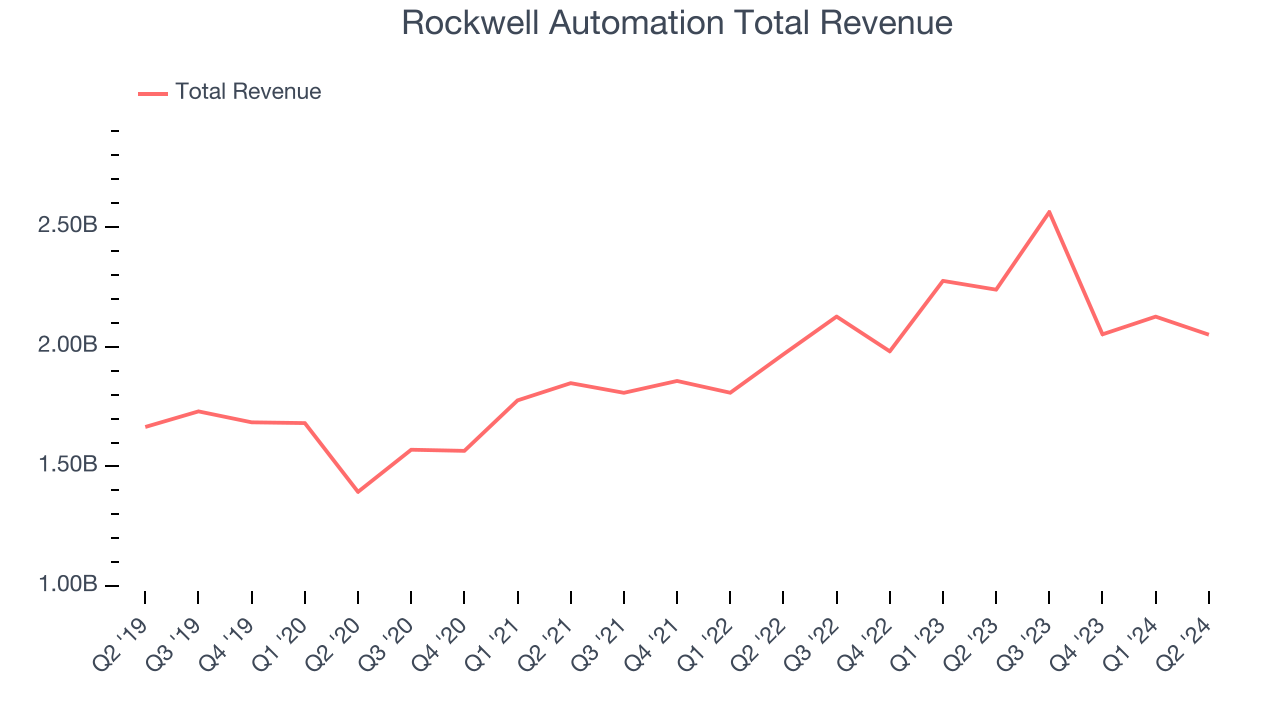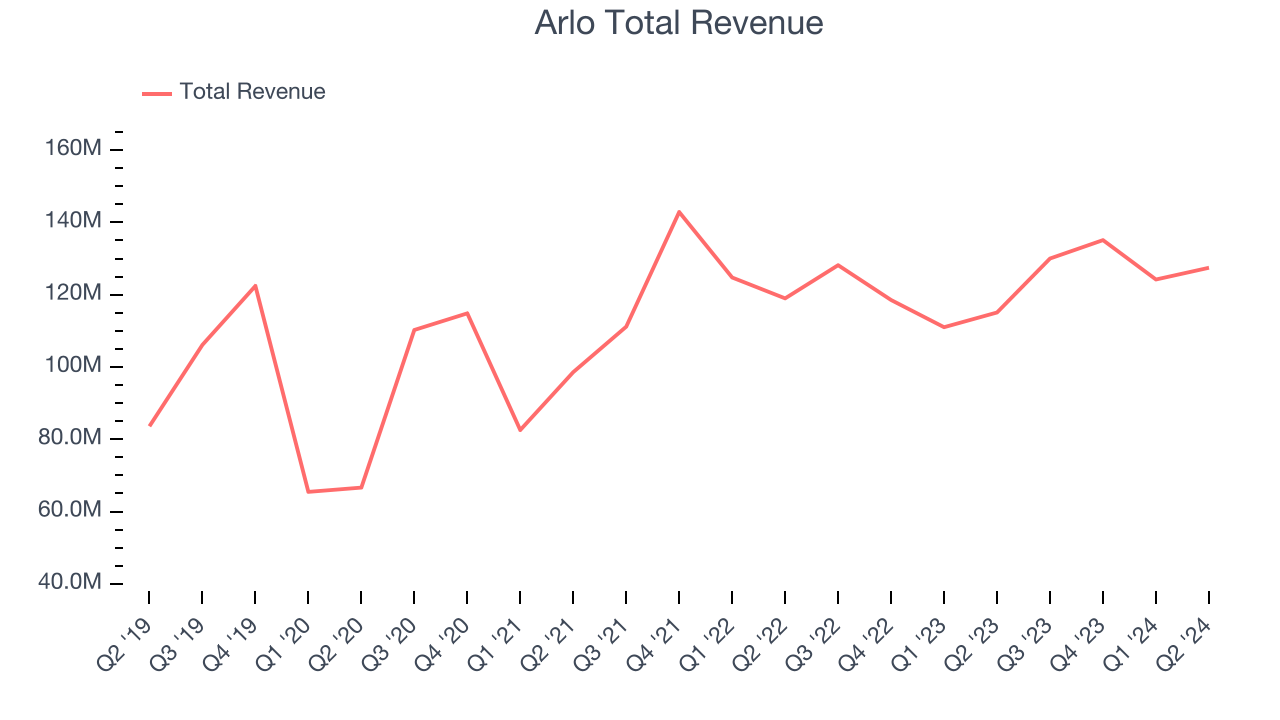The end of an earnings season can be a great time to discover new stocks and assess how companies are handling the current business environment. Let’s take a look at how Rockwell Automation (NYSE:ROK) and the rest of the internet of things stocks fared in Q2.
Industrial Internet of Things (IoT) companies are buoyed by the secular trend of a more connected world. They often specialize in nascent areas such as hardware and services for factory automation, fleet tracking, or smart home technologies. Those who play their cards right can generate recurring subscription revenues by providing cloud-based software services, boosting their margins. On the other hand, if the technologies these companies have invested in don’t pan out, they may have to make costly pivots.
The 7 internet of things stocks we track reported a slower Q2. As a group, revenues missed analysts’ consensus estimates by 1.9% while next quarter’s revenue guidance was 3.4% below.
After much suspense, the Federal Reserve cut its policy rate by 50bps (half a percent) in September 2024. This marks the central bank’s first easing of monetary policy since 2020 and the end of its most pointed inflation-busting campaign since the 1980s. Inflation had begun to run hot in 2021 post-COVID due to a confluence of factors such as supply chain disruptions, labor shortages, and stimulus spending. While CPI (inflation) readings have been supportive lately, employment measures have prompted some concern. Going forward, the markets will debate whether this rate cut (and more potential ones in 2024 and 2025) is perfect timing to support the economy or a bit too late for a macro that has already cooled too much.
Internet of Things stocks have held steady amidst all this with average share prices relatively unchanged since the latest earnings results.
Best Q2: Rockwell Automation (NYSE:ROK)
One of the first companies to address industrial automation, Rockwell Automation (NYSE:ROK) sells products that help customers extract more efficiency from their machinery.
Rockwell Automation reported revenues of $2.05 billion, down 8.4% year on year. This print was in line with analysts’ expectations, and overall, it was a very strong quarter for the company with an impressive beat of analysts’ earnings and EBITDA estimates.
"Rockwell delivered another quarter of good execution with sales, margin, and EPS all above our expectations. I’m particularly pleased with the progress we are making on driving productivity to support our long-term margin expansion targets. We are already seeing the benefit from these actions this fiscal year and expect to drive margin growth and productivity through FY25 and beyond. On the demand side, we did see additional project delays this quarter, with customers citing weaker consumer demand, high interest rates, and policy uncertainty around tax, tariffs, and stimulus incentives as the main drivers for deferring their investment plans. Therefore, while we saw progress on inventory de-stocking at our distributors and machine builders in Q3, our low-single-digit sequential growth in orders was lower than we expected," said Blake Moret, Chairman and CEO.

Interestingly, the stock is up 6.4% since reporting and currently trades at $266.71.
Is now the time to buy Rockwell Automation? Access our full analysis of the earnings results here, it’s free.
Arlo (NYSE:ARLO)
With its name deriving from the Old English word meaning “to see,” Arlo (NYSE:ARLO) provides home security products and other accessories to protect homes and businesses.
Arlo reported revenues of $127.4 million, up 10.8% year on year, outperforming analysts’ expectations by 1.9%. The business performed better than its peers, but it was unfortunately a softer quarter with a miss of analysts’ EPS estimates.

Arlo scored the biggest analyst estimates beat among its peers. Although it had a fine quarter compared its peers, the market seems unhappy with the results as the stock is down 19.5% since reporting. It currently trades at $10.88.
Is now the time to buy Arlo? Access our full analysis of the earnings results here, it’s free.
Weakest Q2: Emerson Electric (NYSE:EMR)
Founded in 1890, Emerson Electric (NYSE:EMR) is a multinational technology and engineering company providing solutions in the industrial, commercial, and residential markets.
Emerson Electric reported revenues of $4.38 billion, up 11% year on year, falling short of analysts’ expectations by 1.3%. It was a disappointing quarter as it posted a miss of analysts’ earnings estimates.
The stock is flat since the results and currently trades at $108.
Read our full analysis of Emerson Electric’s results here.
Vontier (NYSE:VNT)
A spin-off of a spin-off, Vontier (NYSE:VNT) provides electronic products and systems to the transportation, automotive, and manufacturing sectors.
Vontier reported revenues of $696.4 million, down 8.9% year on year. This number missed analysts’ expectations by 6.7%. Overall, it was a disappointing quarter as it also produced underwhelming earnings guidance for the full year.
Vontier had the weakest performance against analyst estimates among its peers. The stock is down 11.5% since reporting and currently trades at $34.74.
Read our full, actionable report on Vontier here, it’s free.
SmartRent (NYSE:SMRT)
Founded by an employee at a real estate rental company, SmartRent (NYSE:SMRT) provides smart home devices and software for multifamily residential properties, single-family rental homes, and student housing communities.
SmartRent reported revenues of $48.52 million, down 9.1% year on year. This number lagged analysts' expectations by 6%. Overall, it was a softer quarter as it also logged a miss of analysts’ operating margin estimates.
The stock is flat since reporting and currently trades at $1.65.
Read our full, actionable report on SmartRent here, it’s free.
Join Paid Stock Investor Research
Help us make StockStory more helpful to investors like yourself. Join our paid user research session and receive a $50 Amazon gift card for your opinions. Sign up here.
